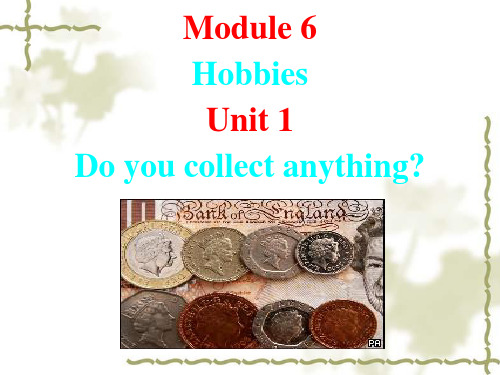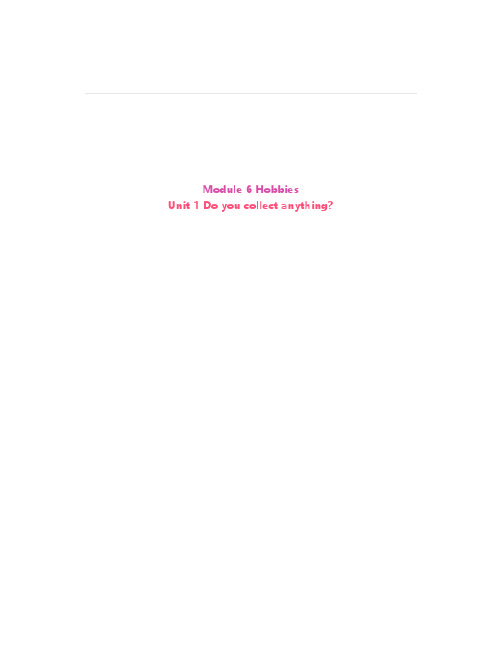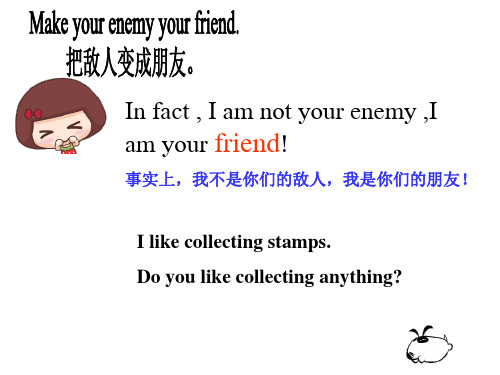Unit 1 Do you collect anything
Module6Unit1Doyoucollectanything外研版八年级英语下册

The pretty girl with long hair is my
younger sister.
n. 价值;有用性
讲解: value作不可数名词,意为“价值; 有用性”。其形容词为valuable, be of value = be valuable,意为 “是有价值的”。 例句:
动词have/has之后,实义动词之前, 多用于肯定句中。
I’ve just come back from Wuhan.
Task1: Pre-speaking
Let’s say the name of collection
stamp
model c美元 pound n. 英镑
◆ He deeply knows the value of health. 拓展:
value还可作动词,意为“重视; 珍视”。
adv. 只是;仅仅
讲解: just副词,意为“只是;仅仅”。 例句: ◆ It was just an ordinary experience. 拓展: just作副词,还可意为“刚才;刚 刚”,常与现在完成时连用,置于助
3.Which hobby do you think takes up (占据) the most space?
I think collecting toy cars takes up the most space.
Task4: Fast reaing
选择最佳答案。
( )1.How many fans does Lingling have?
Task 6: Show time
Lingling
Tony
Task 7: Pairwork
Module6Unit1Doyoucollectanything教案2022-2023学年八年级英语

外研版八年级下册Module 6 Unit 1 Do you collect anything教案Objective:➢Students will be able to discuss and describe their personal collections, using appropriate vocabulary and expressions. Materials:✓FLTRP New Standard English Grade 8, Module 6, Unit 1 textbook.✓Visual aids (pictures of various collections).✓Whiteboard and markers.✓Small cards with vocabulary words related to collections. Introduction:Warmup Activity:1)Begin with a short discussion about hobbies. Ask students if theyhave any hobbies or if they know someone with an interesting hobby.2)Show pictures of different collections to generate interest anddiscussion.Vocabulary Introduction:(1)Introduce relevant vocabulary related to collecting (e.g., stamps,coins, postcards, etc.).(2)Use small cards with words and images to make it interactive.Listening and Speaking Activity :Listening Comprehension:1)Play an audio clip or have a dialogue related to collecting hobbies.2)Ask students to listen for specific information, such as types ofcollections mentioned.Pair Work:(1)Have students work in pairs to discuss if they collect anything andwhy.(2)Encourage the use of vocabulary introduced earlier.Class Discussion:◆Bring the class together for a discussion. Ask a few pairs to share theirconversations with the whole class.Language Practice:Role Play:✧Divide the class into groups and assign each group a differentcollection scenario (e.g., buying, selling, trading).✧Students roleplay conversations using the vocabulary learned.Language Games:❖Conduct vocabulary games, such as a word matching game or charades, to reinforce new terms.Writing Activity :Personal Collection Writing:1)Ask students to write a short paragraph about their personalcollection.2)Emphasize the use of descriptive language.Peer Review:◆Have students exchange papers and provide feedback to their peers.Closure :Reflection:1)Lead a short class discussion on what students learned during thelesson.2)Ask if anyone discovered a new interest in collecting.Homework:◆Assign a reflective writing task where students share their thoughts oncollecting and its importance.Assessment:(1)Participation:◆Assess students based on their engagement in pair and groupdiscussions.(2)Language Use:◆Evaluate the use of vocabulary and expressions in written and spokenactivities.Extension Activities:✧Organize a class exhibition where students can display theircollections.✧Invite a guest speaker who is passionate about collecting to sharetheir experiences with the class.。
初中英语_Module 6 Hobbies unit1 Do you collect anything教学设计学情分析教材分析课后反思

Module 6 HobbiesUnit 1 Do you collect anything?教学设计教学目标:1.知识目标:学生能学会并正确使用下列单词和词组,如:fan, stamp, coin, notes, have a look, value, valuable…2.能力目标:①学生能够听懂有关爱好的谈话,并能从中提取信息。
②学生能够询问他人的爱好、介绍自己的爱好,并表达自己的看法。
3.情感目标:①启发学生收集东西关注的不是价值而是意义。
②引导学生培养良好的兴趣爱好,促进学生的全面发展。
学情分析本模块是对“业余爱好”相关知识的学习,这是一个既有意义,又能引起学生兴趣的话题,是培养学生兴趣、爱好的良好素材。
初中二年级学生对这一类已早有体会,话题、内容都贴近现实生活,整体难度不大,所以学生在学习的过程中也不会感觉太吃力。
教材分析本模块的主题是“爱好”,教材中所选的对话、短文及拓展阅读讨论的都是学生的爱好,贴近学生的生活实际,容易引起学生的共鸣、激发学生的兴趣。
同时,本模块安排的教学内容可带领学生系统地、更深入地学习有关“爱好”的具体内容,不但能促进学生的身心成长,还能培养兴趣、拓展视野、丰富头脑。
Unit1的主题是“Do you collect anything?”主要以第3部分的对话为核心内容,展开对新单词、短语、句型和语法的学习,在认识、理解和掌握知识点的基础上,辅以听、说、写的练习,让学生通过学习、练习,能学有所用、学有所得。
教学步骤:Warming upT: What do you like doing when you are free?S: I like …T: So your hobby is …T:What’s your hobby?S:My hobby is …【设计意图】通过师生问答,让学生说出更多的爱好,在幻灯片中出示新学单词,从而让学生学会对爱好的表达,为下一步的听力扫除障碍。
Module6Unit1 Doyoucollectanything 课件外研版八年级英语下册

7.Can you buy me some s tamps from the post office? I want to send these letters.
8.You can’t go into the cinema to see a film if you don’t have a t icket .
a mess . Have you tidied it
up?
3.这是他们一生中的最重大的时刻。
It’s the biggest moment in
their
lives .
4.你花多少时间在音乐上?
How long do you spend
on
music?
5.我的工作和你的一样多。
My work is as
(2)you know在这里是一个插入语,可以表示“你知道的,跟你这么说 吧,也就是说,就像是”等,主要用于进一步补充或解释前面未说明 清楚的事情。
如:He is 60 years old,you know,but he still takes part in this year’s marathon. 你知道的,他60岁了,但他仍然参加今年的马拉松比赛。 (3)pound和dollar分别是英国和美国的货币单位,有复数形式,但中 国的货币单位元(yuan)、角(jiao)和分(fen)则没有复数形式。
目录
词汇专练
要点解说
课后巩固
PART THREE
课后巩固
KE HOU GONG GU
一、单项选择。
( D )1.My room is
a mess.
A.a bit B.a few C.lots of D.a bit of
( D )2.Jim likes eating fruit, oranges.
外研八下英语Module6Hobbies朗读精讲+知识点总结

Module 6 HobbiesUnit 1 Do you collect anything?【对话翻译】玲玲:嗨,大家好!进来找地方坐下。
不好意思,(家里)有点乱。
我来把这些扇子放到架子上。
贝蒂:让我看一看。
你有这么多扇子。
玲玲:是啊,大约六十把。
贝蒂:你从哪儿得到它们的?玲玲:它们大部分是礼物。
大家经常给我扇子作为礼物,因为他们知道我喜欢扇子。
你收集什么东西吗?贝蒂:是的,我收集硬币和纸币,你知道,比如英镑和美元。
玲玲:硬币?它们一定很值钱。
我可以看看它们吗?贝蒂:当然可以!我还要给你看看我的邮票。
我收集了世界各地的邮票。
我已经有六七本集邮册了。
托尼:我的爱好没有你们的那么费钱——我收集票、公共汽车票和火车票!贝蒂:用废弃的票你不能做任何事情!托尼:我知道,但当我看到它们时,我会记起一些美好的地方。
玲玲:是的!它们的价值并不总是重要的。
人们也收集东西而仅仅为记住他们生命中某些重要的事情。
Module 6 HobbiesUnit 2 Hobbies can make you grow as a person.课文翻译:戴维的爱好很多学生都有爱好,比如阅读、绘画、种菜和照看动物。
有些爱好是休闲的,有些是忙碌的。
爱好可以促使你成长,培养你的兴趣,并帮助你学习新技能。
戴维史密斯是一名学生,他的爱好之一是写作。
在2010年夏天,他参加了一个为期四周的夏令营。
除了像航行和爬山这样常见的活动以外.还有一门写作课程。
“老师是一位作家,她让我们谈论我们的生活、讲有趣的故事。
然后她鼓励我们写在营地的经历。
”回到学校后,戴维以一个16岁男孩的生活为题材写了一个故事,并于2012年成书出版。
许多年轻人喜欢他的书,戴维因此成为了一名成功的年轻作家。
载维很幸运,因为他的爱好给他带来了快乐和成功。
但写作不是他唯一的爱好,他还对许多其他事情感兴趣。
“我也喜欢打排球,”戴维说,“我花了一部分业余时间在校队打排球。
或许在我将来的书中我会写一写我的排球队。
Unit1 Do you collect__ anything

9. I often listen to him play the violin. hear sth. hear sb. do / doing sth. listen to sb./ sth. listen to sb. do sth. e.g. Can you hear the song? I heard the baby cry the whole night. The students are listening to the teacher carefully.
7. What made you so interested in music? make sb. do sth. make sb. + adj. make sb. + n. e.g. Listening to music can make me happy. They made the boy monitor. Colors can change our moods and make us __ happy or sad, energetic or sleepy. A. to feel B. feeling C. felt D. feel ∨
books
I ____________ books because they like collecting are helpful.
violins
I have a collection of violins because I’m ___________ music. interested in
fans
I’ve got three ____. fans
I like collecting model planes ________ because they are interesting.
M6 Unit 1 Do you collect anything (公开课课件)

should c_o__ll_e_c_t_ your ideas.
1.2 Listen
1. Listen and find out who collects the things in the pictures.
Tony
when you were young, Mum? Tony’s mum: Yes, I collected postcards and fans—
you know, Chinese fans. Tony : I see.
collect fan postcard stamp ticket tidy up toy
some wonderful places.
看
L: Right. Their value isn’t always important, people
also collect things just to remember something
important in their lives.
on ons’s life 在某人的一生
collecting fans beautiful at the age of ten
Exercise
1. Your room is a bit of a mess. Please ___
now.
A. tidy up it
B. tidy it up
C. take up it
D. take it up
Tony thinks _______________is expensive.
A. collecting toy cars B. stamp-collecting 3. Which hobby do you think takes up the most
Unit 1 Do you collect anything?教案4-优质公开课-外研八下精品

Unit 1 Do you collect anything?教案学习目标:1.运用已学的时态询问别人的爱好;2.运用“w”开头的疑问词及how进行问答;重点单词:collect v.收集collection n.收集tidy v.收拾,整理adj.干净的fan n.扇子;狂热爱好者stamp n.邮票least adj.最少的;最小的Interview n. / v. 采访,会见;面试重点短语:tidy up收拾take up占用have a collection of收集……all the time一直,总是(be) interested in对……感兴趣listen to 听at the end of在……结尾; 在……末端重点句型:1. Which hobby do you think takes up the least space?2. I’ll tidy up the table and chairs.3. What made you so interested in music?4. I often listened to him play the violin.5. What’s happening on Friday?难点句型解析1.Which hobby do you think takes up the least space?你认为哪个爱好占用的空间最少?此句为混合疑问句,是由“特殊疑问词+do you think+陈述语序”构成,用来征询对方的看法或推测等。
混合疑问句实质上是一种倒装句,是为了强调“要问的事情”,即特殊疑问词部分,因此将“要问的核心内容”前置。
其中的do you think是插入语。
当疑问词在句中做主语时,去掉do you think,句子仍然完整,语序不变;当疑问词在句中做宾语时,去掉do you think,语序会发生变化。
可以用于这一结构的动词还有believe, imagine, suppose等如:• Who do you think is the best student? (疑问词做主语)你认为谁是最好的学生?• Who do you think she is talking with? (疑问词做宾语)你认为她正在和谁谈话?。
- 1、下载文档前请自行甄别文档内容的完整性,平台不提供额外的编辑、内容补充、找答案等附加服务。
- 2、"仅部分预览"的文档,不可在线预览部分如存在完整性等问题,可反馈申请退款(可完整预览的文档不适用该条件!)。
- 3、如文档侵犯您的权益,请联系客服反馈,我们会尽快为您处理(人工客服工作时间:9:00-18:30)。
Unit 1 Do you collect anything?
【学习目标】
知识目标
1. Words:fan, stamp, tidy up, shelf, as, coin, note, pound, dollar, cent, must, valuable, with, value, just
2. 简单句的基本结构。
3、能听懂和阅读关于介绍爱好的语言材料,能通过相关词汇和图片描述自己和他人的爱好;能编写关于爱好的对话。
情感目标:
学会倾听他人的爱好,了解他人的爱好;能够与同伴积极合作,参与课堂活动,大胆实践;能形成广泛的兴趣爱好。
【学习难点】
1. 简单句的基本结构。
2. tidy up和have a look短语的使用。
【学习过程】
Step 1 Warming up Ss look the pictures and answer the questions.
Step 2 Listening (课本43 1 2)(听力训练)
1. Listen and find out who collects the things in the pictures.
Keys: Tony: Tony’s father: Tony’s mum:
2. Answer the questions. Use the words and expression in the box to help you.
1) What does Tony’s mum want him to do?
2) Which hobby does Tony think is expensive?
3) Which hobby do you think takes up the most space?
Step 3 Reading (课本43 3)(读前听)
1. Listen to the conversation and answer the following questions.
1) Where did Lingling get fans?
2) Are the coins and notes valuable?
2. Read the dialogue and mark T or F.(听后读)
1) There are about sixty fans in Lingling’s house.
2) Lingling collects British pounds and US dollars.
3) Betty collects six or seven books of stamps from all over the world.
Now complete the notes.
Lingling’s hobby: ___________________
Betty’s hobbies: ____________________
Tony’s hobby: ______________________
Step 4 Language points读后学
1. Which hobby do you think takes up the most space?你认为哪种爱好占据最大的空间?
take up 占用,占据
e.g. They take up too much space. 它们占了太多空间。
2. Let me have a look.让我看一看
have a look 看一看,后面不加名词。
have a look at sth. 看……, 后加宾语。
e.g. You’d better go to the factory and have a look. 你最好到厂里去看一看。
Let me have a look at the map. 让我看看这张地图。
3. People often give me fans as presents because they know I like them.人们经常把扇子作为礼物送给我。
as prep.作为,当e.g. The foreigner will come to our home as a guest.
那个外国人将会作为客人来我们家。
4. They must be very valuable.它们一定很值钱。
must 一定,肯定,用于表示某事可能是真实的。
must be 必定是,用于表示确切判断。
e.g. In England traffic must keep to the left. 在英国,车辆必须靠左行驶。
He must be an honest boy. 他肯定是一个诚实的孩子。
5. My hobby doesn’t cost as much as yours.我的爱好不像你的那么费钱。
as … as 和……一样……
e.g. His fans are as valuable as yours. 他的扇子和你的一样有价值。
6. Their value isn’t always important.它们的价值并不总是很重要。
value n.价值;有用性
valuable adj.值钱的;有价值的
e.g. This book will be of great value to him in his study.这本书将对他的研究有很大价值。
This painting is very valuable. 这幅绘画非常名贵。
Step5 Read the dialogue loudly in pairs (学后读)
Step 5Complete the passage with the correct form of the words in the box(读后说)
Many people collect things, like postcards and toys. They like to put them (1) __________ special to look at. Lingling collects fans and keeps them on a (2) ____ in her bedroom. Betty collects (3) _____ and notes, such as British (4) ______ and US (5) ______. She also collects stamps from all over the world. T ony collects tickets, but Betty thinks that you cannot do anything with old tickets. Lingling thinks that people also enjoy collecting things to (6)
_________ something important in their lives.
Step6 Work in pairs. Ask and answer the questions about your hobbies.(学以致用)1What’s your hobby?
2Why do you enjoy your hobby?
3When did you start doing it?
4How often do you …?
5Where do you …?
Step 7Homework
编写对话,介绍一下你的爱好。
60词左右.。
